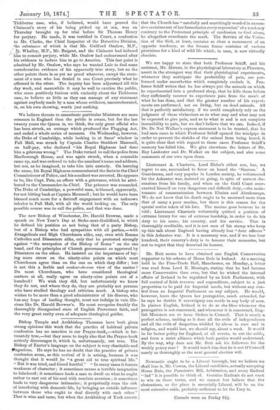Bishop Temple and Archbishop Thomson have both given strong opinions
this week that the practice of habitual private confession has no sanction in our Prayer-book,—which is for- tunately true,—but they seem to imply also that the Prayer-book actively discourages it, which is, unfortunately, not true. The Bishop of Exeter's language on the subject is very charitable and ragacious. He says he has no doubt that the practice of private confession arose, as this revival of it is arising, because it was thought that it would be "a great aid to true spiritual life." "But it was tried, and found hurtful." "In many cases it fosters weakness of character; it sometimes causes a terrible temptation to falsehood ; it sometimes leads a man to dwell on what he ought rather to cast out of his soul with resolute aversion ; it sometimes leads to very dangerous intimacies ; it perpetually runs the risk of interfering with domestic life, by bringing an outside influence between those who ought to deal directly with each other." That is wise and terse, but when the Archbishop of York asserts


































 Previous page
Previous page